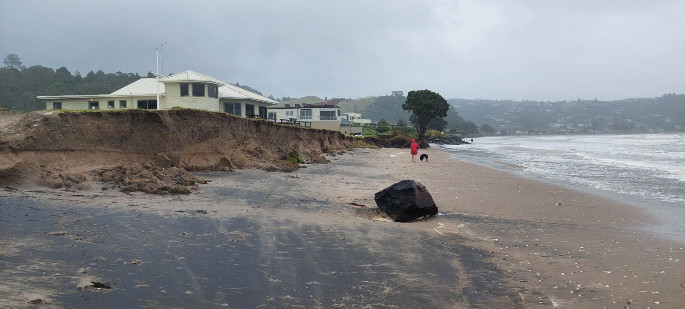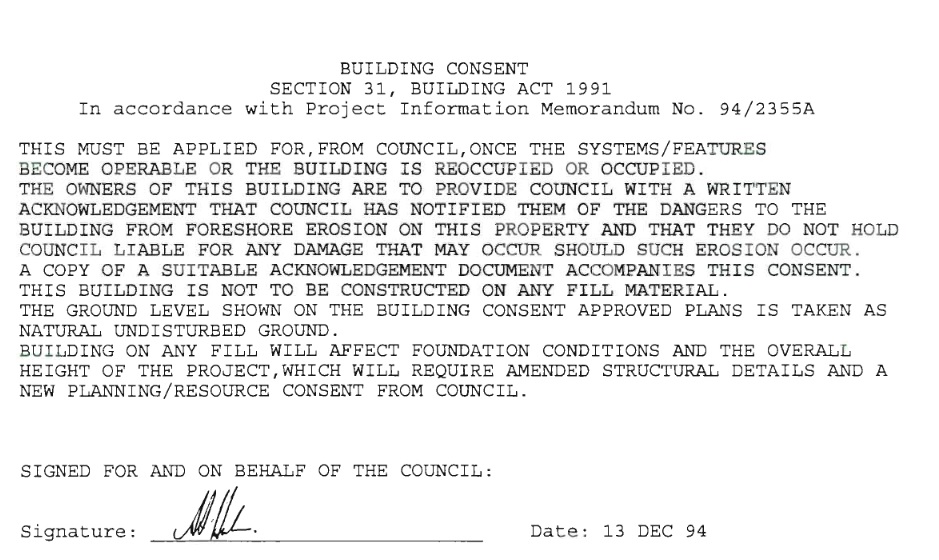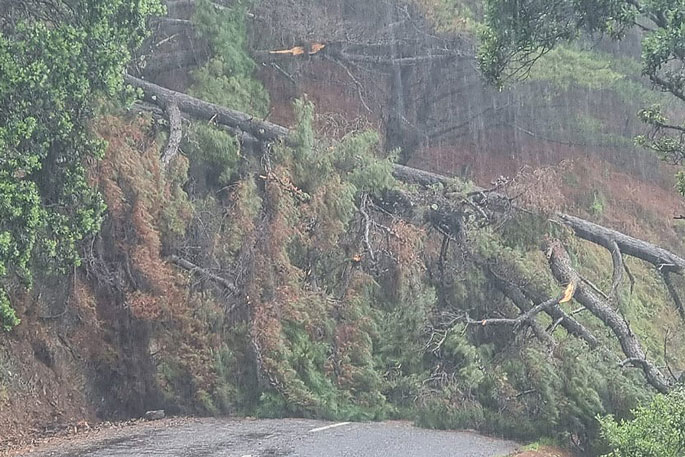A Whitianga boating club is nearly on the edge of falling off its bank into the sea following a high tide on Tuesday morning.
The Mercury Bay Boating Club has lost metres of bank with the house next door also under threat say locals at the beach.
Richard Shelford-Woodcock says the land dropped away into the sea at around 10.30am as high tides and strong swells have crashed against the unprotected shore.
'It's an easy 50 metres length of land, right in front of the boat club,” says Richard.
.jpg)
.jpg)
High tides and strong swells have carved away metres of land in front of the Mercury Bay Boating Club on Tuesday morning. Photo: Richard Shelford-Woodcock.
The significant beach erosion comes after nearly four metres of land being lost into the sea since May 2021.
Large chunks of sand have been carved out by the bad weather as Cyclone Hale unleashes on the Coromandel peninsula.
They are struggling to keep the erosion from reaching the building,” says Thomas Everth who is at the scene.
'The house next door to the boat club is also struggling.”
.jpg)
High tide is due again around 10pm on Tuesday. Photo: Richard Shelford-Woodcock.
Thames Coromandel District Council says its emergency management team has been advised that 400mm of rain is now forecast to fall for the event thorugh to 10pm tonight, "meaning ex-cyclone Hale will likely be a one in 20-year storm event".
(1).jpg)
Mercury Bay Boat Club at low tide on Tuesday January 10, 2023. Photo: Thomas Everth.
Difficult day for club
Mercury Bay Boat Club commodore Jonathan Kline says it's been a very difficult day.
'In a nutshell the erosion in front of the club has accelerated dramatically in the last 24 hours,” says Jonathan. 'We are in a serious predicament right now.
'We attempted to work with council all day today to get some relief and emergency action but in the legal framework our plight doesn't fit in with legal requirements.
'So as much as our mayor would like to help there are certain boundaries legally.”
.jpg)
Mercury Bay Boat Club commodore Jonathan Kline. Photo: Kelly Hodel/Stuff .
Jonathan says the club has been working over the last year to relocate the building.
'We were under the assumption we had a year or two to work through the consent process. But this development today means we have to save the building.
'We were hoping that with our council's permission, we would use concrete blocks we have procured to mitigate the wave action but the council can't endorse this because we don't legally meet the framework.”
(1).jpg)
Mercury Bay Boat Club at low tide on Tuesday January 10, 2023. Photo: Thomas Everth.
He says the club has been placed in the difficult position of ignoring the law and doing it anyway 'which carries huge risk to our committee members”.
'We had hoped to do that right now between 2-6 pm with council help but we have had to make the decision not to do it right now.”
Accusations of tree vandalism
Local resident Richard Shelford-Woodcock says that the removal and poisoning of pohutukawa and pine trees along the shore has contributed to the significant erosion.
'It's sad to see what's happened to the boat club and along much of the coastline. Help us to protect our coast from vandals who are poisoning the pohutukawa and pine trees to get their million dollar view,” says Richard.
'At Kuaotunu, 46 trees were removed last year. People are poisoning the trees and council has been putting signs up. The deep root system of the trees is what keeps the bank together.
"Residents have been asked to spend between $5000 and $10,000 to reinforce the bank with rocks and stones."
.jpg)
A sign which is 10 metres from the Mercury Bay Boat Club was placed there by Thames Coromandel District Council following a tree being vandalised. Photo: Richard Shelford-Woodcock.
.jpg)
Pohutukawa trees along the waterfront facing the onslaught of the sea. Photo: Thomas Everth.
.jpg)
Pohutukawa trees along the waterfront. Photo: Thomas Everth.
.jpg)
Pohutukawa trees along the waterfront facing the sea's onslaught. Photo: Thomas Everth.
Richard points out a tree near the boat club property that is standing still against the onslaught of the weather.
'There have been a few incidents of tree poisoning and sawing but we've had no trees vandalised on our club property,” says Jonathan. 'Most of our community is in favour of keeping the trees.”
High tide on Tuesday night
The next high tide is due at 10pm. Jonathan says he fears it will be a worse outcome than the morning's high tide.
'The rain has eased but we have moderate to high winds, and a rough sea,” says Jonathan.
.jpg)
The impact of the sea on Tuesday morning showing erosion after high tide. Photo: Richard Shelford-Woodcock.
Erosion since 2018
The significant beach erosion comes after nearly four metres of land being lost into the sea since May 2021.
Thomas Everth has taken a series of photographs that show how much the sea has advanced on the land since 2018.
A rock in the photographs remains in its same location, with the erosion taking away metres of land.
"Back in 2018 the front of the sand cliff was in line with the rock wall in front of the houses behind," says Thomas.
.jpg)
A photo from 2018 showing the location of the large rock. Photo: Thomas Everth.
(2).jpg)
A photo from January 10, 2023, showing the location of the large rock. Photo: Thomas Everth.

The beach below the Mercury Bay Boating Club at low tide on Tuesday January 10, 2023. A large rock still lying where it was photographed in 2018 marking the edge of the bank highlights how much of the land has been eroded away. Photo: Thomas Everth.
.jpg)
Aerial view of the Mercury Bay Boating Club. Image: TCDC property viewer app.
The situation worsens from June 2021
In June 2021, the club was predicted to be about five storms away from falling off its bank. From May 2020 to June 2021 nearly four metres of land was lost as high tides and strong swells crashed against its unprotected shore.
Over the years, the Thames Coromandel District Council and the Buffalo Beach Ratepayers Association have worked together to try to protect Mercury Bay's assets by installing sand bags, groynes at Flaxmill Bay and supporting regular planting days.
A large rock wall was also put up by the association more than 10 years ago in front of a stretch of beachfront homes but 'for whatever reason the rock wall left out three homes and the club on the tail end”, Jonathan told Stuff in 2021.
.jpg)
The erosion along the waterfront is impacting on properties without rock walls. Photo: Thomas Everth.
Thomas Everth says the then owners of a beachfront property didn't want a rock wall "back in the day".
"There is one house along the wall that did not take part in paying for the rocks. The first two houses north of the boating club have a rock wall and the third house declined. Thereafter the wall continues."
Without a rock wall, the club's beachfront remained exposed. At the time of the Stuff interview, Jonathan said 'we have protection all around us and different styles of protection, but we don't have anything”.
'We decided that we wanted to try to monitor what was happening and not just guess with vague terms how much we'd lost."

The building consent issued by the Thames Coromandel District Council to the Mercury Bay Boating Club in 1994 includes a statement about council notifying the club of the dangers to the building from foreshore erosion. The building consent is for 50 years. Image: Supplied.
During that year up to June 2021, Jonathan says they'd lost between 3.5 to 4 metres of the bank and club land.
In a November 2020 report, council's coastal scientist also predicted a similar outcome with an average erosion rate of 4.5 metres per year.
But more frequent winter storms and an updated survey from RMS surveyors, carried out from July 5, 2020 to June 3, 2021, shows that the original 14metres between clubhouse and beach has now almost halved, placing the club more severely at risk.
'We've been advocating to continue the rock wall that's already here, but we feel it's also just as important that groynes structures are added which can trap sand and build the beach back up again.”
Extending the rock wall, however, was estimated to cost around $600,000 in June 2021.
Moving the building was considered as another option, but at the time that too would be costly and the club didn't have the funds. It was estimated that to move the building would cost around $75,000 for building consent, resource consent, picking up the building and reconnecting the facility.
Jonathan said at the time that it was 'a very expensive proposition to move the building 10 metres when the 10 metres may only buy us 10 years. It's a very tricky situation”.
.jpg)
Memorabilia of notable moments of the Mercury Bay Boating Club, including the KZ1 America's Cup campaign. Photo: Kelly Hodel/Stuff.
The club has been a part of the community since 1948 and became the first New Zealand boating club to challenge for the America's Cup in 1989. It has around 165 members and 50 junior sailors.
What's next
'This committee has been doing professional surveys since 2020 and we recorded six metres of ground loss since 2020,” says Jonathan.
'We always knew it would it would be impossible to estimate the rate of erosion because it's based on storms.
'Our next move is to understand quickly how we can engage building movers to move the club building back and out of harm's way as an emergency measure. This is not how we planned to do it. We planned to do it in one go.”
He's feeling very dismayed at the Thames Coromandel District Council stance.
'Our approach has always been collaborative with our council but we haven't saved this building and even today we haven't been able to utilise emergency responses that will help mitigate what may happen tonight or tomorrow," says Jonathan.
'As a council if we don't take all measures to preserve our services for our youth then what is the point? I recognise this is a huge problem around the country with sea level rising but in this situation it was very frustrating to have materials that we organised this morning that arrived and we've been told we can do it but at our own risk.”
.jpg)
The club owns the clubhouse building and leases the land from council. Photo: Kelly Hodel/Stuff.
A plea for support for the club
Jonathan is hoping that the wider regional community will support the club as the club's focus is to serve youth and a wide range of community groups.
'We are venue for weddings, memorial services, exercise groups, surfers and other community activities.
'But our main interest is our youth and junior sailing. That's where we have our greatest number of members. Please help us, please do it for the kids. Going forward we really need support.
'If anyone wants to support our efforts the first step will be to become a member.”
.jpg)
The club has been a part of the community since 1948 and became the first New Zealand boating club to challenge for the America's Cup in 1989. Photo: Kelly Hodel/Stuff.
SunLive have contacted Thames Coromandel District Council and will update this once that response is available.


.jpg)

2 comments
erosian
Posted on 10-01-2023 14:48 | By dumbkof2
if you want to build on the waters edge you take the consequences. dont expect ratepayers to pay for your protection
erosion
Posted on 11-01-2023 15:05 | By skeeter
Well, whoever poisoned the trees to access better views certainly will be getting views now!!
Leave a Comment
You must be logged in to make a comment.